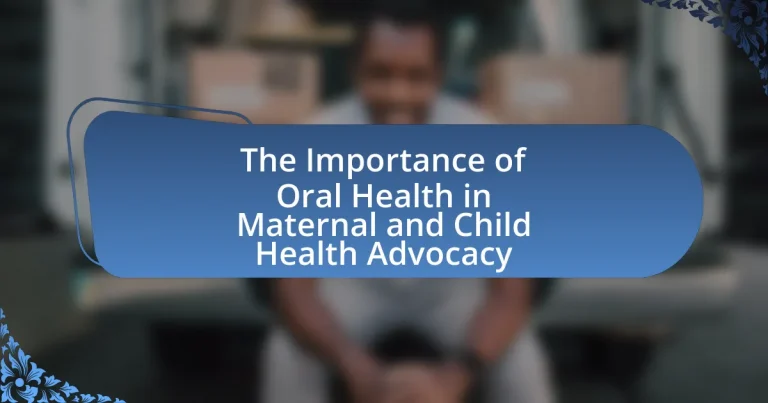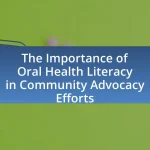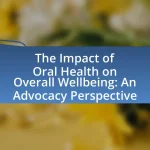Oral health is a critical component of maternal and child health advocacy, significantly influencing health outcomes for both mothers and their children. Poor oral health during pregnancy can lead to complications such as preterm birth and low birth weight, while maternal dental issues can adversely affect a child’s oral health. The article explores the importance of maintaining good oral hygiene during pregnancy, common oral health issues faced by pregnant women, and the long-term effects of poor oral health in early childhood. It also discusses strategies for integrating oral health into maternal and child health programs, the role of healthcare providers in educating expectant mothers, and the challenges in advocating for oral health access among underserved populations.
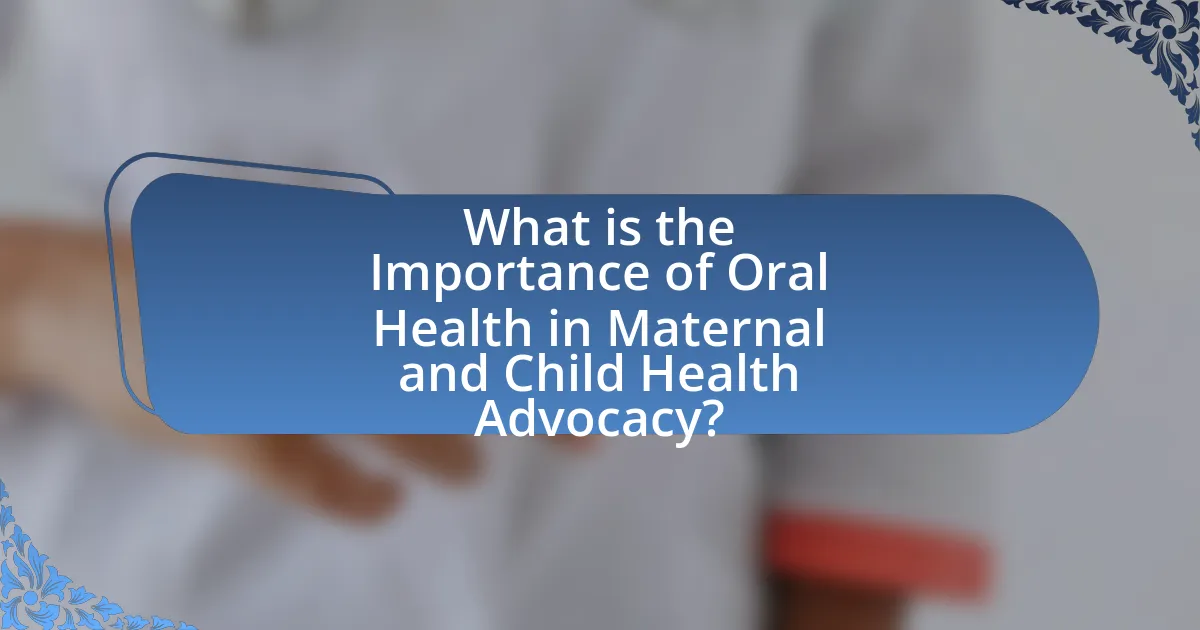
What is the Importance of Oral Health in Maternal and Child Health Advocacy?
Oral health is crucial in maternal and child health advocacy because it directly impacts the overall health outcomes for both mothers and their children. Poor oral health during pregnancy can lead to complications such as preterm birth and low birth weight, as evidenced by studies indicating that periodontal disease is associated with these adverse outcomes. Furthermore, maternal oral health influences the child’s oral health, as mothers with untreated dental issues may pass on harmful bacteria to their infants, increasing the risk of early childhood caries. Therefore, promoting oral health in maternal and child health initiatives is essential for improving health outcomes and reducing healthcare costs associated with dental diseases.
Why is oral health crucial during pregnancy?
Oral health is crucial during pregnancy because poor dental hygiene can lead to complications such as preterm birth and low birth weight. Research indicates that pregnant women with periodontal disease are at a higher risk for these adverse outcomes, as inflammation and bacteria from gum disease can enter the bloodstream and affect the fetus. Additionally, maintaining good oral health helps prevent dental issues that can arise due to hormonal changes during pregnancy, which can exacerbate existing dental problems. Therefore, prioritizing oral health is essential for the well-being of both the mother and the developing child.
What are the common oral health issues faced by pregnant women?
Pregnant women commonly face oral health issues such as gingivitis, periodontal disease, and dental caries. Gingivitis occurs due to hormonal changes that increase blood flow to the gums, leading to inflammation and bleeding. Periodontal disease can develop if gingivitis is left untreated, potentially affecting overall health and pregnancy outcomes. Dental caries, or cavities, can also increase due to dietary changes and cravings for sugary foods during pregnancy. Research indicates that poor oral health during pregnancy is linked to adverse outcomes, including preterm birth and low birth weight, highlighting the importance of maintaining oral hygiene during this period.
How does oral health impact pregnancy outcomes?
Oral health significantly impacts pregnancy outcomes by influencing both maternal and fetal health. Poor oral health, particularly periodontal disease, has been associated with adverse pregnancy outcomes such as preterm birth, low birth weight, and gestational diabetes. Research indicates that women with periodontal disease are more likely to experience preterm labor, with studies showing a 7.5 times higher risk of preterm birth in affected individuals compared to those with healthy gums. Additionally, the inflammatory response triggered by oral infections can affect systemic health, potentially leading to complications during pregnancy. Therefore, maintaining good oral hygiene and seeking dental care during pregnancy is crucial for improving overall pregnancy outcomes.
What role does oral health play in child development?
Oral health plays a crucial role in child development by influencing overall health, nutrition, and psychosocial well-being. Healthy teeth and gums are essential for proper chewing and nutrition, which directly affects growth and cognitive development. Research indicates that children with poor oral health are more likely to experience difficulties in school due to pain, infection, and absenteeism. Additionally, oral health issues can lead to low self-esteem and social challenges, impacting a child’s emotional and social development. Studies show that children with untreated dental caries are at a higher risk for developing behavioral problems and lower academic performance, highlighting the integral connection between oral health and comprehensive child development.
How does maternal oral health affect a child’s oral health?
Maternal oral health significantly impacts a child’s oral health. Poor maternal oral health can lead to the transmission of harmful bacteria to the child, increasing the risk of dental caries and periodontal disease. Studies indicate that mothers with untreated dental issues are more likely to have children with similar problems, as maternal oral bacteria can be passed to infants through saliva during activities like kissing or sharing utensils. Additionally, maternal conditions such as periodontal disease have been linked to adverse pregnancy outcomes, which can indirectly affect the child’s overall health and development, including oral health.
What are the long-term effects of poor oral health in early childhood?
Poor oral health in early childhood can lead to significant long-term effects, including chronic dental issues, impaired growth and development, and negative impacts on overall health. Children with untreated dental problems often experience pain and discomfort, which can hinder their ability to eat, speak, and concentrate in school. Research indicates that children with poor oral health are more likely to suffer from low self-esteem and social difficulties, as they may be embarrassed about their appearance or experience bullying. Furthermore, studies show a correlation between poor oral health and systemic health issues, such as cardiovascular disease and diabetes, later in life. For instance, a study published in the Journal of Dental Research found that children with dental caries are at a higher risk for developing chronic diseases as adults. Thus, the ramifications of poor oral health extend beyond immediate dental concerns, affecting physical, emotional, and social well-being throughout a person’s life.
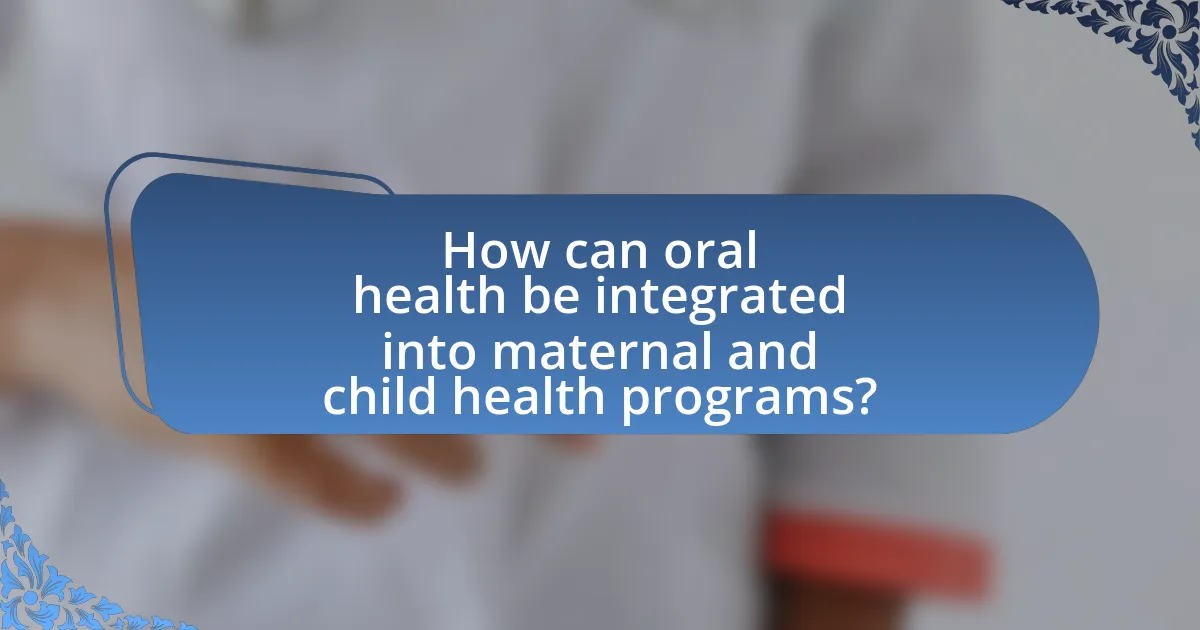
How can oral health be integrated into maternal and child health programs?
Oral health can be integrated into maternal and child health programs by incorporating routine dental screenings and education on oral hygiene practices during prenatal and postnatal visits. This integration is essential because maternal oral health directly impacts fetal development and child health outcomes; for instance, poor maternal oral health has been linked to preterm birth and low birth weight. Evidence from the American Academy of Pediatrics indicates that addressing oral health during pregnancy can reduce the risk of dental caries in children, highlighting the importance of preventive care. Additionally, training healthcare providers in maternal and child health to include oral health assessments can enhance the overall health of mothers and their children, ensuring a comprehensive approach to health care.
What strategies can be employed to promote oral health among pregnant women?
To promote oral health among pregnant women, strategies include providing education on the importance of oral hygiene, ensuring access to dental care, and encouraging regular dental check-ups. Education initiatives can inform pregnant women about the risks of periodontal disease, which has been linked to adverse pregnancy outcomes such as preterm birth and low birth weight. Access to dental care can be facilitated through community health programs that offer services specifically for pregnant women, addressing barriers such as cost and transportation. Regular dental check-ups during pregnancy are crucial, as they allow for early detection and management of oral health issues, thereby improving overall maternal and child health outcomes. Research indicates that maintaining good oral health during pregnancy can significantly reduce the risk of complications, highlighting the necessity of these strategies.
How can healthcare providers educate expectant mothers about oral health?
Healthcare providers can educate expectant mothers about oral health through structured prenatal education programs. These programs should include information on the importance of maintaining oral hygiene during pregnancy, as poor oral health can lead to complications such as preterm birth and low birth weight. Evidence from the American Dental Association indicates that hormonal changes during pregnancy can increase the risk of gum disease, making it crucial for expectant mothers to understand proper dental care practices. Providers can utilize pamphlets, workshops, and one-on-one consultations to convey this information effectively, ensuring that mothers are aware of the connection between oral health and overall maternal and child health.
What community resources are available to support oral health education?
Community resources available to support oral health education include local health departments, dental clinics, schools, and non-profit organizations focused on health education. Local health departments often provide programs and materials aimed at educating families about oral hygiene practices and the importance of regular dental check-ups. Dental clinics may offer free or low-cost educational workshops and resources for parents and children. Schools frequently implement oral health education programs as part of their curriculum, teaching children about proper dental care. Non-profit organizations, such as the American Dental Association, provide resources and outreach initiatives to promote oral health awareness in communities. These resources collectively contribute to improving oral health knowledge and practices among families, particularly in maternal and child health contexts.
How can policymakers support oral health initiatives in maternal and child health?
Policymakers can support oral health initiatives in maternal and child health by implementing comprehensive policies that integrate oral health care into maternal and child health programs. This integration can be achieved through funding for preventive services, such as dental screenings and education on oral hygiene for pregnant women and young children. Research indicates that maternal oral health directly impacts child health outcomes; for instance, untreated dental issues in mothers can lead to adverse pregnancy outcomes, including low birth weight and preterm birth. By allocating resources to training healthcare providers in oral health practices and promoting public awareness campaigns, policymakers can enhance access to necessary dental care, ultimately improving health outcomes for mothers and children.
What policies can enhance access to dental care for pregnant women and children?
Policies that can enhance access to dental care for pregnant women and children include expanding Medicaid coverage for dental services, implementing school-based dental programs, and increasing funding for community health centers that provide comprehensive dental care. Expanding Medicaid coverage allows low-income pregnant women and children to receive necessary dental services, as studies show that states with more comprehensive Medicaid dental benefits report higher utilization rates among these populations. School-based dental programs facilitate access by providing preventive and restorative care directly in schools, which is crucial since many children face barriers to accessing care outside of school. Additionally, increasing funding for community health centers ensures that underserved populations receive essential dental services, as these centers often serve as a primary care source for low-income families.
How can funding be allocated to improve oral health services in maternal health programs?
Funding can be allocated to improve oral health services in maternal health programs by directing resources towards integrated care models that combine dental and prenatal services. Research indicates that pregnant women with access to comprehensive oral health care experience fewer complications, such as preterm births and low birth weight, which are linked to poor oral health. For instance, a study published in the Journal of the American Dental Association found that women who received dental care during pregnancy had a 30% lower risk of adverse pregnancy outcomes. Allocating funds for training healthcare providers in oral health education and preventive care can further enhance service delivery, ensuring that maternal health programs effectively address oral health needs.
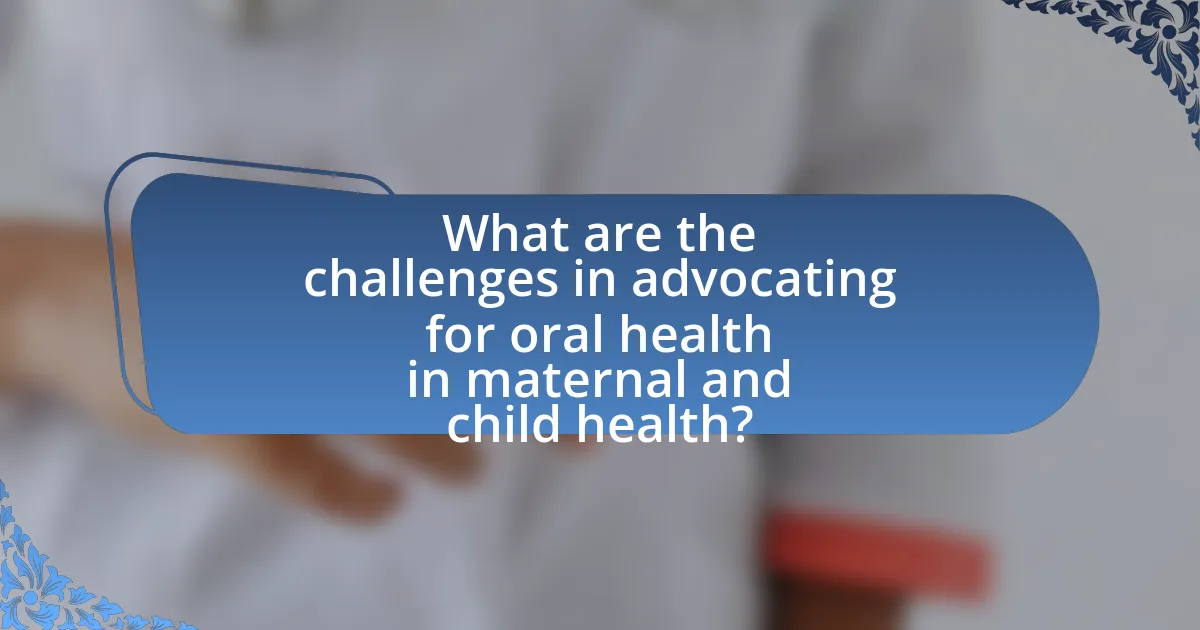
What are the challenges in advocating for oral health in maternal and child health?
Advocating for oral health in maternal and child health faces several challenges, including limited awareness among healthcare providers and the public regarding the significance of oral health during pregnancy and early childhood. Research indicates that many healthcare professionals do not prioritize oral health, leading to inadequate referrals and education for expectant mothers. Additionally, socioeconomic barriers, such as lack of access to dental care and financial constraints, hinder effective advocacy efforts. A study published in the Journal of Public Health Dentistry highlights that low-income families often lack resources for preventive dental care, which is crucial for maternal and child health. Furthermore, cultural beliefs and misconceptions about dental care during pregnancy can impede advocacy initiatives, as some individuals may not recognize the importance of oral health for overall well-being.
What barriers exist in accessing oral health care for mothers and children?
Barriers to accessing oral health care for mothers and children include financial constraints, lack of transportation, limited availability of services, and insufficient awareness of oral health importance. Financial constraints often arise from high costs associated with dental care, which can deter families from seeking necessary treatments. Lack of transportation can hinder access to dental clinics, especially in rural areas where services may be scarce. Limited availability of services, particularly in underserved communities, results in long wait times and fewer options for care. Additionally, insufficient awareness about the significance of oral health can lead to neglect of dental hygiene practices and preventive care, ultimately affecting the overall health of mothers and children.
How do socioeconomic factors influence oral health access?
Socioeconomic factors significantly influence oral health access by determining individuals’ ability to afford dental care, access transportation, and navigate healthcare systems. For instance, individuals with lower income levels often lack dental insurance, which restricts their ability to seek preventive and restorative dental services. According to the American Dental Association, approximately 74 million Americans live in areas with a shortage of dental professionals, disproportionately affecting low-income populations who may not have the means to travel to distant providers. Additionally, education level correlates with oral health literacy, impacting individuals’ understanding of the importance of oral hygiene and regular dental visits. Research published in the Journal of Public Health Dentistry indicates that lower socioeconomic status is associated with higher rates of dental caries and untreated dental issues, further illustrating the barriers faced by these populations in accessing necessary oral health care.
What cultural perceptions affect oral health practices among mothers?
Cultural perceptions significantly influence oral health practices among mothers by shaping their beliefs about dental care and hygiene. For instance, in some cultures, there is a strong emphasis on traditional remedies over professional dental care, leading mothers to prioritize home-based treatments for their children’s oral health. Additionally, cultural attitudes towards pain and discomfort can affect how mothers perceive the necessity of dental visits; in cultures where enduring pain is normalized, mothers may delay seeking professional help for their children’s dental issues. Research indicates that cultural beliefs regarding the importance of oral health can directly impact behaviors such as regular brushing, dietary choices, and the frequency of dental check-ups, ultimately affecting children’s oral health outcomes.
What are the best practices for improving oral health advocacy?
The best practices for improving oral health advocacy include increasing public awareness, engaging community stakeholders, and integrating oral health into overall health policies. Increasing public awareness can be achieved through educational campaigns that highlight the importance of oral health, as studies show that informed communities are more likely to prioritize dental care. Engaging community stakeholders, such as schools, healthcare providers, and local organizations, fosters collaboration and resource sharing, which enhances advocacy efforts. Integrating oral health into overall health policies ensures that oral health is recognized as a critical component of overall health, supported by research indicating that poor oral health can lead to systemic health issues.
How can interdisciplinary collaboration enhance oral health advocacy efforts?
Interdisciplinary collaboration can enhance oral health advocacy efforts by integrating diverse expertise to address complex health issues more effectively. For instance, collaboration among dental professionals, pediatricians, nutritionists, and social workers can lead to comprehensive strategies that tackle both oral health and its social determinants. Research indicates that such collaborative approaches can improve health outcomes; a study published in the Journal of Public Health Dentistry found that community-based interventions involving multiple disciplines significantly increased access to dental care for underserved populations. This evidence supports the notion that interdisciplinary efforts can create more holistic and impactful advocacy initiatives in oral health.
What role do public health campaigns play in promoting oral health awareness?
Public health campaigns play a crucial role in promoting oral health awareness by disseminating information and encouraging preventive behaviors among the population. These campaigns utilize various media platforms to educate individuals about the importance of oral hygiene, the consequences of poor oral health, and the benefits of regular dental visits. For instance, the Centers for Disease Control and Prevention (CDC) reports that community water fluoridation, a public health initiative, has significantly reduced tooth decay in children by 25% over a span of 5 years. Such campaigns not only raise awareness but also empower communities to adopt healthier practices, ultimately contributing to improved oral health outcomes, particularly in vulnerable populations like mothers and children.
What practical steps can individuals take to improve oral health during pregnancy and childhood?
To improve oral health during pregnancy and childhood, individuals should prioritize regular dental check-ups, maintain a balanced diet, and practice good oral hygiene. Regular dental visits allow for early detection and management of oral health issues, which is crucial as hormonal changes during pregnancy can affect gum health. A balanced diet rich in vitamins and minerals supports the development of healthy teeth in children and helps pregnant individuals maintain their oral health. Additionally, brushing teeth twice daily with fluoride toothpaste and flossing regularly are essential practices that help prevent cavities and gum disease. Research indicates that poor oral health during pregnancy can lead to complications such as preterm birth and low birth weight, emphasizing the importance of these steps.
